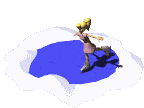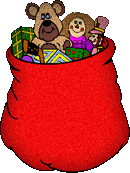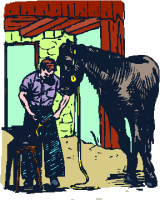

The Village Has a Wedding
So the village has more or less run itself. The hotel is enjoying excellent trade; more inns have more rooms to let; another stop has been added to the train schedule; and Mr. Gerald Peters has managed to create a children's haven once again for the season. All is well. More or less.
It's just not fair.
The children are scandalized at the very idea. "For sure, that would be a terrible thing," he agrees. "And that is why this year, we will still have candy and cake and cookies, and, if I'm not mistaken, perhaps some wee small gifts. We shall have to see what's under the tree," he adds with a wink, gesturing toward the heavily decorated tree on his snowy veranda.
Someone who has no skates at all is Eloise, though she had asked Santa for them three years in a row. Her mother still thinks it's just too dangerous and that Eloise could get hurt. "Don't you agree, Mr. Peters?" she asks the kindly old gentleman.
Poor Eloise. "Oh, mama. Please please stop." Eloise wasn't very interested in skating anymore, anyway. She was more interested in the boy nearby who was rolling a snowball in his hand. She kind of liked the boy but was leery of the snowball.
With reason. The boy was a classmate who sat behind her and who enjoyed teasing her with a gentle yank on her pigtail. But snowballs were different. Would he really throw one at her, right in front of her mother?
Eloise is about to find out.
Where candy is, that's where you'll find Jeffrey and Jimmy. By now they have made an art of helping themselves to candy wherever they see it. And today they discover it in the form of candy canes, looped over the branches of Mr. Peters' Christmas tree.
"And what if he doesn't, huh?" Jeffrey says, balancing awkwardly. "You know how I feel about candy canes. Move in closer!"
"Shh! He'll hear you!"
"No he won't; he can hardly hear nowadays."
Actually, Mr. Peters could hear pretty well. This time he chooses not to, because he knows how Jeffrey feels about candy canes.
The banker shrugs. "I wasn't surprised to learn it. Apparently that killjoy neighbor Bette Wilson — the one with the petition — managed to collect enough protest signatures to catch the mayor's eye. Wanting to keep the peace, Pittman managed a compromise: Gerry Peters can still set up his village, but only once every three years — though last year Gerry wasn't up to it anyway. His lumbago was that bad."
Max turns away to cough. Miss Martha eyes the cigar in his hand. "Yes, yes, I know. I ought to give 'em up. I plan to do that. One of these days ...."
On the rink itself, poor Steven is embarrassing himself again. He tries so hard, but he never was, and never will be, either an athlete or a skater. He is more than amazed that Alice seems to think he can be. She leans over, and her sparkling blue eyes are all enthusiasm. "That's the longest I've ever seen you stay upright on skates, Steven. Really, you are improving all the time!"
Steven would much rather be home reading a book or writing a poem (especially about Alice), but he knows Alice likes the ice, and so on the ice he'll stay. Even if it's mostly on his keister.
Someone who loves the ice even more than Alice is Sonja. Sonja had to give up her dream of competing when she broke her ankle years earlier, but her ankle has long since healed well enough for her to enjoy just being on the ice. And now, one marriage and two children later, the petite but incredibly strong woman has made time to skate her heart out, if only for an hour or two, with her husband standing by in admiration. (Johnny Hooks is confident enough to skate a straight line but too brawny to be able to turn. He's just as happy to watch.)
And then there's poor Billy. It goes without saying that he'd rather stay on the sidelines than actually mix it up with other skaters. But Mickey is having none of it. Giving Billy a little shove from behind, Mickey more or less commands his chunky cousin to get out there. "They're just people, Billy. That's all. People! You can do this." Why, oh, why, must the boy still, to this day, be afraid of people.
As for the women, they're as leery of the deer as the deer are of them. "Don't startle them, whatever you do," one of them cautions the others. "They will likely panic and then who knows what -- or who -- they'll trample over! They might crash through a fence and get hurt. We'll just have to stand here, or, better yet, let's step back into the house. Shopping in the village can wait a few more minutes."
It's a pity, though, that so few windows in the hotel face the street, because you could almost have a view of the bride and her new husband from inside. But it was at the mayor's wife's insistence, when the hotel was being renovated, that the view be concentrated on the exquisite gardens in back. So: no view of the bride. Or the groom. (But most of the guests were in the church anyway.)
The boys choir is out in front of the hotel, warming up. They are nervous; this is their first paying job. (Actually, the pay is more like a donation to the school's music department.) Their recent successes have been so great that they have officially named themselves the Boys Choir -- not very imaginative, but they wanted to make sure that no girls joined in. "Yuk. Girls. Let them form their own choir," the boys insisted to the choirmaster. And, indeed, the choirmaster is in the process of doing just that. Next year.
Passing in front of the hotel, old Farmer Hooks finds himself yet again hauling a chain of sleds through town that will end at the Peters skating rink. Some of the children bring their skates, but some do not; those children stay on board for the return trip. That Yolanda girl at the end is a round-tripper, much to the farmer's dismay. Year after year, shriek after shriek -- why, she don't know the meaning of thoughtful silence. She just be smitten with the sound of her own voice. How do her mum bear it?
He wonders anew how the mayor managed to rope him into the task. Blackmail, is how, he decides. Mayor Pittman has offered Hooks a new mare at a very fair price. Well all right, call it a bribe, more like, he admits to himself. He could live with that. He nods to Sam Rickman, who as ever is sweeping the path clean, and gives the reins a slight shake. Yes, a very fine mare. He could live with that.
Her husband the mayor, however, has not. He's there, along with his good friend Doctor Greene as well as attorney Pettifore and other society types who have been invited. But no Lavinia. "Dash it all," he mutters to his friends while joining in a cheery Huzzah! for the couple. "This time she's gone too far. This rivalry with Dorothea has got to end."
The doctor says in an undertone, "Maybe the marriage will change things." He looks around and sighs. "And speaking of missing wives, my Grace must still be out with her patient. Well, an emergency is an emergency. I well know it."
"But my wife's absence is not an emergency," the mayor fumes. "I shall speak to her directly about this."
"No you won't," the doctor says with a smile. And he's right.
Harmony is there. She would not miss this event for the world, because she's quite fond of Dorothea.
"Me, I like the Cap'n," her husband says. "He's not a man of many words, but what he says is usually worth listening to."
"I'm glad we didn't bring the children," Harmony admits. "They would never have sat still through such a long ceremony."
"Hah. I'm surprised the Cap'n was able to," Will says with a wink.
There is one couple in attendance who are more focused on one another (of course) than on the bride and groom: Clyde and Margaret. "We are very lucky, are we not?" Margaret tells her husband. "We met while young and have been able to have a family. Not so, Dorothea. Can you be that old and still fall in love?"
Clyde laughs. "Don't let her hear you say that!"
Nearby, the Woodcuts have grabbed the bench and cups of cider and are doing what they do best: surveying the scene. Mrs. Woodcut, who sees everything, notes that two women who should be at the wedding are not: Lavinia Pittman and Grace Greene. "One's on purpose, one isn't, is my guess," she remarks. Her husband shrugs. "Nothin' new there. Cider's good, ain't it."
Old man Macgowan has stopped by, too, but more to rest his legs and chat a bit than to see the show. "I'm lookin' for me cat. Ain't seen her around, this day or two. "She's always off somewhere," he adds, sighing. "I just hope she's not back up a tree."
Not far from the wedding guests, but close enough to observe the happy couple, is a younger man, formally dressed, who has hung back from the celebration. That's because he does not feel like celebrating. In fact, he is devastated. He had planned to put on a brave face during the ceremony, but after laying eyes on the radiant bride, his hopes of marrying her forever dashed, he feels faint and falls on one knee, pretending to have stumbled.
He should not have come. He and Dorothea were acquaintances, no more than that, from the old days. He fully understood now that he'd misunderstood her, and yet here he was: somewhat heartbroken. Get hold of yourself, man, he chides himself.
If he's lucky, he can catch the afternoon train back home.
Yes. Happy.
"You certainly did, Minnie, but ... you know ... this doll is meant for a little girl who is very, very sick. That's why we're here, sweetheart ... to make a sad little girl -- all the sad children -- feel better. And don't you think that this doll would do that?"
Downcast, Minnie murmurs, "I suppose so. I would feel better."
"Of course you would. And you get to be home for Christmas, and who knows what wonderful presents will be under your tree? So we have to make sure that the children who have to stay here and can't go home yet ... we have to make sure that they will be almost as happy as you on Christmas morning."
He smiles reassuringly and says, "Now put the doll back, please. I wonder what else we have in my sack? Something for the grandmas and grandpas here, do you suppose?" He points to a warm blanket wrapped in a big bow. "I think someone old like your grandma would be really pleased with it."
"Oh, well, who cares about that," Minnie answers, somewhat glumly. Blankets held no appeal for her.
Her mood would improve once she saw the smiles on everyone's faces, Santa knew. "The mayor will be joining us in a bit, but right now, let's go inside and hand out some joy," he says to Minnie and the younger boy whose name he could not remember. Mikey? Markey? Something with an "m," anyway. Or maybe an "n." Noah? Ned ...?
Below them, a couple of young people and a boy have stopped to see what on earth Santa was doing there. The older boy chuckles and says, "Maybe he got the address wrong."
"Don't be daft," his sister says, poking him. (Their little brother was showing signs of distress that he was either too early or too late for Santa, since no one else was around.) "They're obviously here to visit the patients in the hospital. Don't you know anything?"
"Sure I do. I know you're always picking on me," he says, poking his sister back.
The girl lets out a snort. "If we want to join the hayride, we'd better get moving. Come on!"
Not far away, Mrs. Jack Jones, still Miss Bates to the locals, is making her way through the village. She is beside herself with anxiety: Boots, her lovely, silly, one-eyed dog, has gone missing. It is all my fault, all my fault, she keeps repeating. She was out walking with Boots (as usual, with no leash, because why ever did she need one?) and did not realize that some young boys had set up fireworks. Paying no attention, she scarcely noticed Boots, a friendly pup, edging nearer the group to see what was what. The boys were focused on their mission and did not see Boots before setting off the fireworks in rapid succession, sending Boots fleeing in a panic.
"Course it's closed. It's Saturday," Eddy says, struggling with his eternal enemy, the shoelace. Alice had convinced him that he should tie a double knot because the lace was always coming undone, but he hadn't tightened up nearly enough, and now his foot was loose and he couldn't undo the whole mess. Wait 'till he got his hands on his sister!
If Eddy had been paying attention, he would have seen that the wedding in question was just two doors down, but Eddy was not Mrs. Woodcut. Most things escaped his notice except maybe if anyone got a new dog or got suspended from school. Sighing, he tells the stranger, "Try waving down that lady in the carriage; she's the mayor's wife and if anyone would know, she would."
She was not about to change horses, and she was certainly not going to risk her mare suffering a sole bruise or, worse, a torn ligament. No, she absolutely had no choice but to see the farrier and have the mare re-shoed. It was hardly a problem: the farrier was a tenant on one of her properties, and he would surely sweep all aside to tend to her crisis. He would, and he did, and that was that.
Closing the door gently behind her, she is surprised to see Jack Jones about to knock. His voice is trembly and his look stricken as he says, "Have ye seen 'im? Have ye seen our Boots?"
"Why, no, Mr. Jones. I have been inside this past hour or so. I did not hear his bark" -- everyone knew Boots's bark -- "but more than that, I cannot say."
Leaning against one of the porch pillars, Jack Jones tries to catch his breath; he is clearly exhausted from his search. "The missus is beside herself. I must find her pooch. Why, there are wolves out there, and bears. Anything can happen!"
Wolves had not been seen since the 1700s, Grace knew, and bears since not long after that, Grace also knew. Jack Jones needed that reassurance but, more than that, to rest a moment. So she coaxed him into her cousin's house for some of the tea she'd just brewed, and began her best to calm him down.
The reception would have to wait.
I'm going to call her June-bug, even though she doesn't like to be called June-bug. Unless she comes in the next two minutes. No, five minutes. I will wait five minutes. But that's all.
The girl is just so anxious to see Clara's new tea set.
Meanwhile, what's a hayride without hay? Mr. Peters has arranged to add a hayride to the festivities at his home, and it's welcomed by all. The only issue is that the children have been a little overly rambunctious and have tossed out much of the hay. That's why Mr. Peters has ordered another wagonload of it, which is making its way to his house. Behind the wagon (you can't have too much hay), a cart with more of it is being pulled by Patches, a dog nearly as beloved as Boots, guided by his young owner. The boy is very proud of the work he's done with Patches. Why, the pup practically has trained himself, he's so smart. Oh, yes, the boy is convinced, Patches is definitely the pick of the litter.
There is so much to worry about. Where is June? Where is more wood? How can a person possibly serve tea in these conditions?
She sighs heavily. From within, her mother calls out, "Clara, come back inside! You'll catch your death of cold!"
What's the difference, Clara tells herself, turning back. I'll probably catch my death anyway if we don't get wood.
But few knew they were planning to turn the house into an inn! Granted, it had lots of bedrooms, but a couple of them were under the eaves; no one taller than three feet could get into bed without banging their noggin. And then there was the location. Next to a blacksmith's? Truly? This part of town had always housed hard-working men and women with lots of children. It was a neighborhood, a real neighborhood, not some place where visitors would want to be -- although, the neighbors admitted, if this kept up there would be no neighbors, just tourists.
They were tenants on someone else's land. "Why, that Rainbow Inn is jest the beginnin'," says Henry to his brother. Before ye know it, all the houses will be bought up and converted, and then what happens? Lavinia Pittman will sell the land right out from under us for who knows what. Mark me words."
Clarence disagrees. "The Pittman horses need care, and that's what we do. The mayor won't let just anyone oversee his stock."
"And another thing. It don't help that the shop's collapsing. Been months now, and here we are, still waiting for the mayor, or is it his wife, to do somethin' about the roof."
"Did ye not hear her just tell smithy she'd have someone come 'round?"
"Oh, yes, that she did. What else were her t' say?"
"Henry, Henry," his brother replies with a shake of his head. "You always believe your glass be half empty."
The horses that needed shoes were routine jobs, that was one saving grace. The farrier is just finishing up with one when his apprentice brings around another. "Busy today," the apprentice says. "Not every day y' tend the mayor's wife."
"You be more impressed by that than me," Bosun says, finishing up. "A horse is a horse."
His attention is drawn to his front porch, where his wife is calling to him. "John, you will never guess! I did get employ with the new owners! Or will have done, once they open. I'm to make up the beds and such. The Rainbow Inn ... such a pretty name for such a pretty house. They seem very nice folk."
"We'll see," her husband says, nodding. He has very mixed feelings about an inn in the neighborhood. Slippery slope, he is aware.
Meanwhile, a dog is lingering nearby. "Whose dog is that, anyway?" the blacksmith asks his striker. "He been hangin' around all day."
"Dunno. There be something wrong with 'is eye. Mebbe it's a stray."
"No place for a dog. He could get hurt by a spark or worse. Shoo 'im away."
The striker shrugs. "I tried that. He come right back."
"Well, shoo 'im away again! We have work to do."
So the striker tries again, waving his arms at the disoriented and hapless Boots, who is entirely conflicted whether he should go or stay. "Scat, mutt, go on, go on!" shouts the striker.
Fearful now, off the dog runs ... straight into his surprised master's welcoming arms (well, one arm, anyway; the other has to be for his cane).
"Boots, Boots, come 'ere, pooch," cries Jack Jones. "Oh, I know one lady will be happy as a clam at high tide to see ye. Where have ye been?" Jones asks, stroking the dog hard with his free arm. "Givin' us a scare like that! We thought you wuz dead or worse!" The happy dog looks up with soulful eyes, tail wagging furiously, and lets out two or three barks, as if to say, "I was trying to explain to these gentlemen that I was a little lost, but they were not very helpful."
"Come on then," Jack says, "This be no place for a dog."
So everyone keeps saying, the dog thinks, falling in willingly alongside his master. Ahead of the two, not very far away but still out of sight, Mrs. Jack Jones is working her way to the edge of the small village, hoping for the best but fearing the worst.
And so it is that another year rolls along, one among many where water still freezes and war is unknown; where some don't agree but still remain civil; where neighbors care and family matters; and where everyone -- mayor and bride and Minnie and Max -- all hold fast to the same sweet hope: that things are getting better, and life will be getting easier.

The 2023 Christmas mantel. For closeups, click on the houses alongside the story below.
For clickable mantel, click here
for alternate presentation.
Mayor Albert Pittman, the most successful politician the village has ever had, has had a quiet year. No big plans, no big ambitions, no big gambles. Breaking a leg and an arm at the same time in a skiing accident would quiet anyone. But although last spring was hard, the summer was less so, and the fall even better. Now, except for a slight limp, the mayor feels pretty good. You could ask what a man his age was doing on the slopes in the first place, and it would be a fair question, but the villagers were not that surprised: trying to prove something, that's what they all said. They just couldn't figure out what.
 Her mama is baking cookies all day long, from morning to night, and it's not fair, it's just not. June likes cookies as much as anyone, but she hardly gets to eat any, and now she's going to be late because her mama just had to make one more batch before taking June to meet her friends at the other side of town. It's just not very fair. And she doesn't even have skates -- the boots are too tight -- so she can't even go skating while she waits and waits and waits.
Her mama is baking cookies all day long, from morning to night, and it's not fair, it's just not. June likes cookies as much as anyone, but she hardly gets to eat any, and now she's going to be late because her mama just had to make one more batch before taking June to meet her friends at the other side of town. It's just not very fair. And she doesn't even have skates -- the boots are too tight -- so she can't even go skating while she waits and waits and waits.
 Mr. Peters, even more elderly now, is patience itself when asked by the boys and girls. "Well, it turns out that Santa is having a very busy year," he explains. "He's had more requests from many more children, and less help from many fewer elves because, just as everywhere else, the North Pole is hurting from a staffing shortage," he adds. "Now, you would not want your wishes to go unfulfilled, would you? Or to arrive in February?"
Mr. Peters, even more elderly now, is patience itself when asked by the boys and girls. "Well, it turns out that Santa is having a very busy year," he explains. "He's had more requests from many more children, and less help from many fewer elves because, just as everywhere else, the North Pole is hurting from a staffing shortage," he adds. "Now, you would not want your wishes to go unfulfilled, would you? Or to arrive in February?"
 The smell of fresh-baking cookies wafts over them, coming from the house next door. The lady of the house, an excellent baker, has been commissioned by Mr. Peters to keep the cookies coming. She is more than happy to make the extra money; it's much appreciated at Christmastime. Now she will be able to afford the dress that her little June-Bug has fallen in love with and that has an almost matching one for her doll. Oh, and a pair of brand-new ice skates.
The smell of fresh-baking cookies wafts over them, coming from the house next door. The lady of the house, an excellent baker, has been commissioned by Mr. Peters to keep the cookies coming. She is more than happy to make the extra money; it's much appreciated at Christmastime. Now she will be able to afford the dress that her little June-Bug has fallen in love with and that has an almost matching one for her doll. Oh, and a pair of brand-new ice skates.
 Mr. Peters did not agree, but he settled for saying, "The ice is not over a pond, Mrs. Pettifore. No one will be falling in," he added, smiling. Mrs. Pettifore took that smile amiss. "There are other dangers. She could slip and break an ankle, like Sonja" (who was skating beautifully on the ice at that very moment). "Or someone could bang right into my daughter."
Mr. Peters did not agree, but he settled for saying, "The ice is not over a pond, Mrs. Pettifore. No one will be falling in," he added, smiling. Mrs. Pettifore took that smile amiss. "There are other dangers. She could slip and break an ankle, like Sonja" (who was skating beautifully on the ice at that very moment). "Or someone could bang right into my daughter."
 Jimmy isn't sure this is a good idea. "Maybe Mr. Peters plans to hand them out later to us," he whispers to his brother as Jeffrey scrambles up his shoulders.
Jimmy isn't sure this is a good idea. "Maybe Mr. Peters plans to hand them out later to us," he whispers to his brother as Jeffrey scrambles up his shoulders.
A young boy is clutching his hockey stick as he glares at the skaters waltzing, racing, and falling on the brand-new skating rink before him. Everyone knows that the rink is just temporary -- thanks to old Mr. Peters -- but that's just it! It's temporary! And if people are going to use it all day long, how will he be able to practice his hockey game? His sister, sitting nearby on a bench, has decided he needs a little pep-talk.
 "Just get out there, silly! Find a space. You have to make the best of it. That's what the good players do. Nothing is ever perfect," she adds in an even louder tone, because Mildred and Joanna insist on practicing their carols right above her head. "Just make the best of it!" Their cousins on the bench agree. So does their golden retriever; the dog's wagging tail could not be more encouraging.
"Just get out there, silly! Find a space. You have to make the best of it. That's what the good players do. Nothing is ever perfect," she adds in an even louder tone, because Mildred and Joanna insist on practicing their carols right above her head. "Just make the best of it!" Their cousins on the bench agree. So does their golden retriever; the dog's wagging tail could not be more encouraging.
 Fresh out of the woods that ring the village, a doe, her mate, and a pal have ventured far too close to the village and are trying to decide their next move. This will be tricky; there are villagers everywhere. Should they backtrack into the woods? That would be a fine plan if those three women hadn't emerged from the house, watching them keenly. So now what?
Fresh out of the woods that ring the village, a doe, her mate, and a pal have ventured far too close to the village and are trying to decide their next move. This will be tricky; there are villagers everywhere. Should they backtrack into the woods? That would be a fine plan if those three women hadn't emerged from the house, watching them keenly. So now what?

 It's not every day that the village celebrates the marriage of a prominent citizen. (For one thing, there aren't that many prominent citizens.) But the woman who has just been wed is no stranger to managing a wedding -- she's been married before -- and the Grand Hotel is fully up to the task. Each of the rooms for the wedding guests includes a basket with champagne, two glasses, and chocolates. Inside, the banquet room is lined with beautifully set tables around a large dance floor, because the bride loves to dance. She has even thought to provide a bench outside, where hot mulled cider is available for those who feel a chill while they wait to throw rice at the couple as they emerge from the largest church in the village.
It's not every day that the village celebrates the marriage of a prominent citizen. (For one thing, there aren't that many prominent citizens.) But the woman who has just been wed is no stranger to managing a wedding -- she's been married before -- and the Grand Hotel is fully up to the task. Each of the rooms for the wedding guests includes a basket with champagne, two glasses, and chocolates. Inside, the banquet room is lined with beautifully set tables around a large dance floor, because the bride loves to dance. She has even thought to provide a bench outside, where hot mulled cider is available for those who feel a chill while they wait to throw rice at the couple as they emerge from the largest church in the village.
 Because most everyone liked them both. Dorothea had taken some getting used to, it's true. She was an outsider with a very different approach to life and men than the villagers were used to. She was kind and she was generous (she tries to stay anonymous in her gifting, but word gets around). The husbands were charmed, their wives undecided; it did not go well at first. Of course, the main obstacle to Dorothea's acceptance by the village was and remains ... Lavinia Pittman, the mayor's wife. Even wealthier than Dorothea and definitely more controlling, Lavinia Pittman has very mixed feelings about the marriage. On the one hand, marriage should settle Dorothea down a bit. But on the other hand, would that new respectability mean that even more praise would come her way? Dorothea already had looks, money, and charm. Did she really need to enjoy respectability too?
Because most everyone liked them both. Dorothea had taken some getting used to, it's true. She was an outsider with a very different approach to life and men than the villagers were used to. She was kind and she was generous (she tries to stay anonymous in her gifting, but word gets around). The husbands were charmed, their wives undecided; it did not go well at first. Of course, the main obstacle to Dorothea's acceptance by the village was and remains ... Lavinia Pittman, the mayor's wife. Even wealthier than Dorothea and definitely more controlling, Lavinia Pittman has very mixed feelings about the marriage. On the one hand, marriage should settle Dorothea down a bit. But on the other hand, would that new respectability mean that even more praise would come her way? Dorothea already had looks, money, and charm. Did she really need to enjoy respectability too?
 These are the thoughts running through Lavinia's head as she heads for the church — late, as usual. However, for once it was not her fault. Mostly not her fault. Unfortunately, she's close enough to hear the church's bells, which can mean only one thing: she's missed the ceremony.
These are the thoughts running through Lavinia's head as she heads for the church — late, as usual. However, for once it was not her fault. Mostly not her fault. Unfortunately, she's close enough to hear the church's bells, which can mean only one thing: she's missed the ceremony.
 And Dorothea Sparks, the lovely bride who (characteristically) will be keeping her last name? How does she feel about life right now?
And Dorothea Sparks, the lovely bride who (characteristically) will be keeping her last name? How does she feel about life right now?
 Santa may be busy handling overflow orders and staff shortages at the North Pole, but he still keeps an eye on those who need him most. And those are the very young and the very old -- as well as a smattering of in-betweens -- who find themselves in the village hospital for Christmas. With the able help of Mayor Pittman, a look-alike Santa has been engaged to distribute cheer and small gifts to those whose spirits are low in this happiest of seasons.
Santa may be busy handling overflow orders and staff shortages at the North Pole, but he still keeps an eye on those who need him most. And those are the very young and the very old -- as well as a smattering of in-betweens -- who find themselves in the village hospital for Christmas. With the able help of Mayor Pittman, a look-alike Santa has been engaged to distribute cheer and small gifts to those whose spirits are low in this happiest of seasons.
 The look-alike Santa is more than up to the job (he's done this before) and is careful to instruct his children helpers in words they understand. He already knows Minnie, daughter of the village cobbler, and he knows that Minnie is very fond of dolls, which is probably why she has spied one in his bag and yanked it out in triumph. "I found one!" she cries in delight.
The look-alike Santa is more than up to the job (he's done this before) and is careful to instruct his children helpers in words they understand. He already knows Minnie, daughter of the village cobbler, and he knows that Minnie is very fond of dolls, which is probably why she has spied one in his bag and yanked it out in triumph. "I found one!" she cries in delight.

Once again, Eddy has been stood up by Steven. The plan was to meet at city hall, then join some friends at the edge of town and just hang out. Instead, the only one in front of the building was some fellow who was trying to get to some wedding or other in some other part of town. "I was hoping an official here would know, but the place is closed," he tells Eddy.
 The lady in the passing carriage was indeed the mayor's wife, and she definitely knew where the wedding was. The church bells had stopped ringing now, which meant that the entire wedding party was moving indoors at the Grand Hotel. There would be a reception line, of course, and hopefully Lavinia Pittman would be there in time to join the end of it and wish the couple well. (She did not mind that scenario; being the last was just as noteworthy as being the first.) And if she missed it altogether? She would simply explain the truth: her beautiful dappled grey had thrown a shoe.
The lady in the passing carriage was indeed the mayor's wife, and she definitely knew where the wedding was. The church bells had stopped ringing now, which meant that the entire wedding party was moving indoors at the Grand Hotel. There would be a reception line, of course, and hopefully Lavinia Pittman would be there in time to join the end of it and wish the couple well. (She did not mind that scenario; being the last was just as noteworthy as being the first.) And if she missed it altogether? She would simply explain the truth: her beautiful dappled grey had thrown a shoe.
 "Dear, you are not there yet, you just are not. Trust me on this," Grace says in as soothing a voice as possible. The last thing she wants to see is a patient, especially a related patient, panic, as a new mother-to-be is wont to do. So she makes her cousin tea, and strokes her back gently, until at last her cousin is calm enough for Grace to leave. She is more than aware that she's missed the ceremony, but it can't be helped. At least she can hurry to the reception, though her clothes will be less than fitting for the occasion.
"Dear, you are not there yet, you just are not. Trust me on this," Grace says in as soothing a voice as possible. The last thing she wants to see is a patient, especially a related patient, panic, as a new mother-to-be is wont to do. So she makes her cousin tea, and strokes her back gently, until at last her cousin is calm enough for Grace to leave. She is more than aware that she's missed the ceremony, but it can't be helped. At least she can hurry to the reception, though her clothes will be less than fitting for the occasion.
 A little girl clutches her doll, disappointed that her friend and classmate hasn't shown up yet. She and June and Clara were all to meet at Clara's house, with their dolls, and have such a good time; that was how they planned it specially. Clara had just got a porcelain tea set for her birthday, and they were all to have tea. With their dolls.
A little girl clutches her doll, disappointed that her friend and classmate hasn't shown up yet. She and June and Clara were all to meet at Clara's house, with their dolls, and have such a good time; that was how they planned it specially. Clara had just got a porcelain tea set for her birthday, and they were all to have tea. With their dolls.
 The mayor and Max Schurster have no problem with that. They'd encouraged the town council to allow the conversion of the house to an inn. Despite the working blacksmithy, the location was actually ideal for tourists: close to the center of town, close to the harbor, close to the hospital, close to the train. The sleeper neighborhood was being discovered, and the mayor and Max had no problem with that, either.
The mayor and Max Schurster have no problem with that. They'd encouraged the town council to allow the conversion of the house to an inn. Despite the working blacksmithy, the location was actually ideal for tourists: close to the center of town, close to the harbor, close to the hospital, close to the train. The sleeper neighborhood was being discovered, and the mayor and Max had no problem with that, either.
 Both the blacksmith and the farrier who shod Lavinia Pittman's dapple grey were related to the Wright brothers; the business was made up mostly of extended family, many of them from the neighborhood. They were loyal and hardworking and made a decent wage. They were proud of what they did and were well-known and respected in the region. There was just one little thing.
Both the blacksmith and the farrier who shod Lavinia Pittman's dapple grey were related to the Wright brothers; the business was made up mostly of extended family, many of them from the neighborhood. They were loyal and hardworking and made a decent wage. They were proud of what they did and were well-known and respected in the region. There was just one little thing.
 John Bosun was the most skilled farrier in the state, the man you went to if your horse needed a corrective shoe or a diagnosis worthy of a vet. He knew just about everything there was to shoeing, as Lavinia Pittman was well aware. Naturally he did not appreciate having her show up with a demand to have her mare re-shod immediately, but he was able to have her in and out in little more than an hour. So now all he had to do was catch up with his regular customers, and Bob's your uncle.
John Bosun was the most skilled farrier in the state, the man you went to if your horse needed a corrective shoe or a diagnosis worthy of a vet. He knew just about everything there was to shoeing, as Lavinia Pittman was well aware. Naturally he did not appreciate having her show up with a demand to have her mare re-shod immediately, but he was able to have her in and out in little more than an hour. So now all he had to do was catch up with his regular customers, and Bob's your uncle.
 And then she hears the bark. That well-known, well-loved bark!
And then she hears the bark. That well-known, well-loved bark!
2021 Christmas Putz
2020 Christmas Putz
2019 Christmas Putz
2018 Christmas Putz
2017 Christmas Putz
2016 Christmas Putz
2015 Christmas Putz
2014 Christmas Putz
2013 Christmas Putz
2012 Christmas Putz
2011 Christmas Putz
2010 Christmas Putz
2009 Christmas Putz
2008 Christmas Putz
2007 Christmas Putz
Antoinette's Main Christmas Page
Antoinette's Home Page
